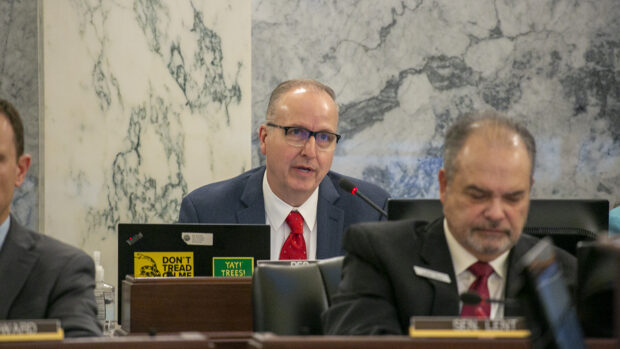After narrowly recapturing his House seat from Britt Raybould, Rep. Ron Nate returned to the Statehouse on the first day of the 2021 legislative session flanked by Lt. Gov. Janice McGeachin and fellow hardline conservative representatives, serving as their de facto spokesman.
“Conservative legislators believe it is time to reassert important checks and balances between the branches of government which have been eroded, especially in 2020,” he said, presenting a slate of policy priorities dubbed the “Idaho Conservative Agenda.”
Anti-lockdown activist Sara Walton Brady filmed the event, wearing a yellow Star of David on her breast emblazoned with the word “EXEMPT,” apparently equating mask wearing during the pandemic with Nazi extermination of Jews during World War II. Reporters in the audience were joined by members of the Idaho Freedom Foundation, a right-wing group whose writings Nate would go on to echo, verbatim without citing them, in the Legislature.
Nate closed the event by interviewing with Freedom Foundation Vice President Dustin Hurst, then paced away in the halls of the Capitol basement.
Over the next two legislative sessions that would follow, Nate would expound upon his own conservative agenda by leading a successful push to cut public university budgets over alleged “social justice indoctrination,” rail against accepting federal money for schools in decrials of federal overreach and deficit spending, and back unsuccessful bids to allow families to spend state money on private school tuition.
Raybould, a foil to Nate’s policy priorities and red-meat rhetoric, remained outspokenly critical of that record in office. “Not sure that folks understood what Ron would do once in office,” she’s betting that her dissatisfaction will resonate with voters, and that they’ll return her to District 34 Seat B just two days shy of the anniversary of her 2020 primary defeat.
Yes, her campaign to oust Nate is about securing water access for fellow farmers, easing the strain of growth on Madison County and “revamping” Idaho’s method of funding schools, but in many ways, it’s about her opponent.
Asked why she didn’t challenge Rep. Jon Weber, R-Rexburg, who holds the district’s other House seat, Raybould answered, “Why would I challenge a sitting legislator who I believe is doing a good job?”
Of elephants and RINOs
The Raybould-Nate fight is one in a batch of legislative matchups pitting hardliners against mainstream Republicans ahead of the May 17 primary. In primaries with similar profiles, the party’s right wing has labeled its orthodox opponents “RINOs,” Republicans in name only, while traditional Republicans have at times cast their challengers as extremists.
Nate and Raybould’s face-off has been one of the closest watched two-horse primaries in the state this May; their contentious rematch comes after Nate took only 52.2% of the vote in 2020. Consequently, Nate and Raybould’s fight for the newly remapped Rexburg-area District 34 could be one of the closest primary races that will help shape the Legislature’s reliably red supermajority for two years to come.

There’s no guarantee education will swing the historically close race in a district that contains Brigham Young University-Idaho, the private Latter Day Saints institution where Nate teaches economics. However, school policy is one of the most obvious areas where the candidates split, with grocery tax repeal — which Nate has tried to advance by deploying extensive legislative maneuvers — as a notable exception.
Rabyould advocates reevaluating the state’s funding formula for K-12 schools and allowing districts greater flexibility in how they spend state money, changes she said could offset district’s reliance on local property taxes.
“That may mean some additional funds going to school districts, but I don’t think that that is an automatic requirement,” she told EdNews in an interview last month.
Nate more definitively said, “I think Idaho’s education system is being well funded,” pointing to coming increases to school funding in a Rexburg Chamber of Commerce debate. He also mentioned $1,000 bonuses for K-12 school staff inked into law by the Legislature in his answer, and Raybould was quick to point out that he voted against the federally bankrolled bonuses.
The contenders’ rhetorical differences are more obvious when it comes to higher education. Raybould, for instance, portrays the state’s public colleges and universities as imperfect competitors for students, and argues if higher ed leaders aren’t meeting the needs of students, students will go elsewhere.
“I get a little bit concerned when we attempt to demonize those who are leading our higher ed institutions, when in fact, they are hardworking and attempting to do their best by the students who they’re serving,” she told EdNews.
Conversely, Nate echoed one of his legislative talking points in warning debate attendees that Idaho is “under attack by a woke leftist agenda.”
“They’re trying to bring critical race theory, a social justice agenda, and they’re grooming kids by sexualizing education and our media. We need a watchman on the tower to make sure that Idaho does not become the next victim of a local leftist agenda,” he said.

A swap of Raybould for Nate could change the tone of Joint-Finance Appropriations Committee meetings, where Nate has pressed higher ed leaders on inclusion efforts and teachings on race during budget writing. Nate’s ouster, combined with ally Rep. Priscilla Giddings, R-White Bird, departing to run for lieutenant governor, would strip JFAC of a vocal two-vote coalition pushing for higher ed budget cuts in the House-Senate group.
Notably, it’s unclear whether a Raybould win would return her to the soon-to-be-reshaped committee, of which she was a member during her lone term in office, since committee assignments are up to majority leaders.
More certain is the fate of the eventual Republican nominee, who will run unopposed in the general election.
Eyeing a fourth term, Nate has portrayed himself as a budget hawk — “the government is swimming in your tax dollars right now” — and a contrarian. On the campaign trail, Raybould has cast him as uncooperative and ineffective, pitching voters on her willingness to work with colleagues to balance the state’s budget.
Their spars over finances haven’t been limited to their legislative records, though.
‘Boise insiders,’ ‘dark money’ and the gold trade
One of the Rexburg debate’s most contentious moments came when Raybould and Nate pointed fingers at one another over donations they’ve received from interest groups.
“My opponent receives over 66% of her donations from special interest groups, from PACs, from Boise insiders,” Nate said, decrying lobbyist’s “disproportionate influence” in the Capitol.
Raybould, the CFO of her family’s farm, netted a combined $7,300 from agriculture groups, including Idaho farms and agricultural political action committees. She also received $1,000 from a credit union PAC, $1,000 from the PAC of United Heritage Trust, the property and casualty company, and $1,000 from the Association of General Contractors. She received $2,000 from the Idaho Consumer Owned Utilities Association and $1,000 from 2018 Republican gubernatorial candidate Tommy Ahlquist.
By EdNews’ count, interest group donations accounted for around $10,000 of her fundraising, a little over 6% of her $165,000 total.
“I don’t know where Ron got his numbers,” Raybould quipped.
Then, she went on the offensive, knocking the $3,000 Nate has received from Freedom Foundation board members and their relatives. She knocked the group for refusing to disclose its donors.
“There’s plenty of money going around. I’m just open about where mine comes from,” Raybould said.
Said Nate, “It’s laughable to me that my opponent talks about dark money, when if you look at your mailbox, you’re seeing all the mail coming about Rep. Nate from these special interest groups who are trying to denigrate a sitting representative for his conservative values.”
He didn’t elaborate on what interest groups he was referring to, and he declined an interview for this story.
Nate received $1,000 from the Bonneville County Republican Central Committee – where Freedom Foundation board members and Nate donors Doyle Beck and Bryan Smith are party officials – in a rare move that got the local party in hot water with the state GOP.
Raybould, a party official for the Madison County GOP, said the donation was “un-American” and “crossed a line.”
“If you set up a system where the central party takes the position that they are going to identify and select the candidate … then frankly, how is that any different than some of these, you know, communist countries with central parties that get to pick and choose which candidates appear on the ballot for their party?” she told EdNews.
Nate, who has unsuccessfully pushed the Legislature to give the state treasurer authority to buy gold and silver, has also received $1,000 from Stefan Gleason, the owner of Eagle’s Money Metals Exchange who has publicly opined in favor of such efforts. Michael Gleason, of the same company, has donated $500. Stefan Gleason also gave $1,000 to Nate’s campaign ahead of the 2020 election, and another $1,000 through his metals business. Nate received another $250 from metals exchange company Midas Gold before his last term began.

Prominent family members of both candidates have chipped into their campaigns, too. Raybould got $1,000 from her grandfather, former Republican Rep. Dell Raybould, who represented Rexburg alongside Nate in the House. Nate got the same amount from his wife Maria Nate, who is active in far-right politics; Maria Nate did not respond to an interview request for this story.
Raybould is sitting on $165,000 to Nate’s $61,000. Though outraising her opponent in 2020 wasn’t enough to win her the race.
Will this election be different? In six days, she’ll know.
